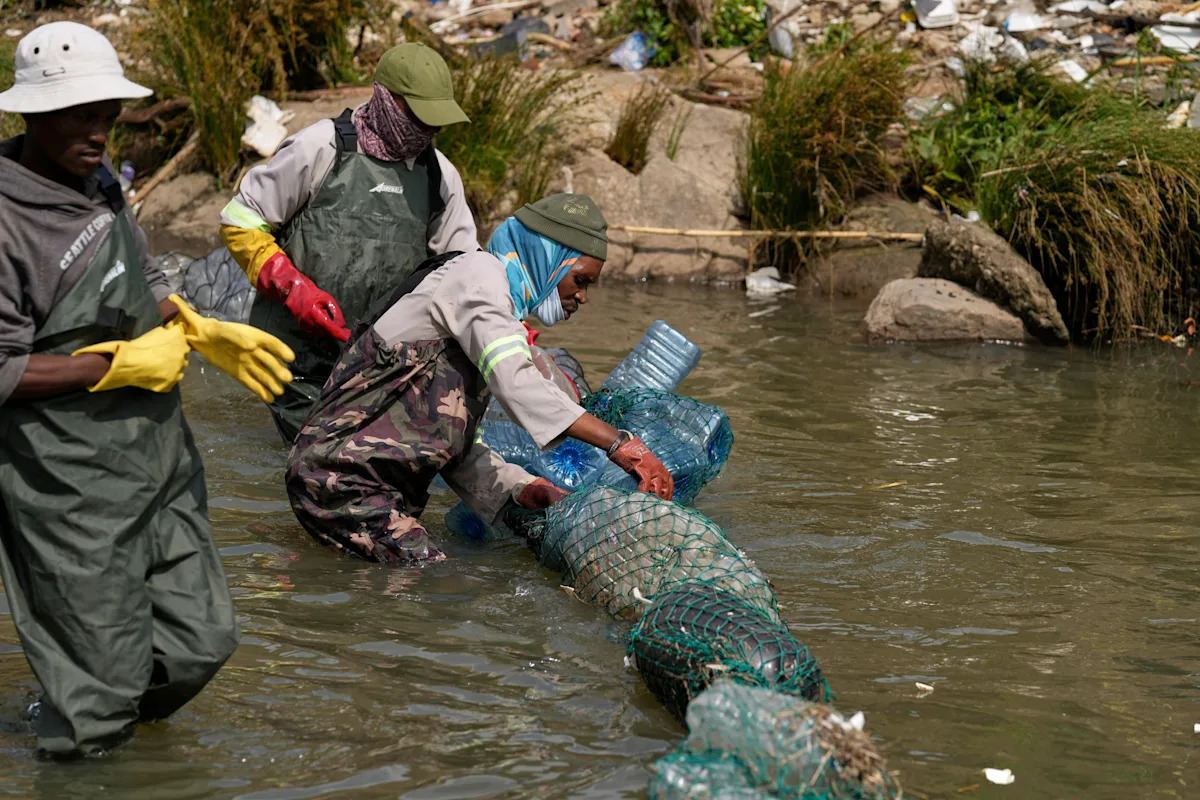JOHANNESBURG (AP) – IN South Africa In this oldest town, volunteers in wetsuits jump into thigh-deep water in the polluted Yukskei River to untangle a net designed to catch debris but damaged by heavy rains. Without networks, huts in low-lying Alexandra on the outskirts of Johannesburg could face catastrophic flooding.
World leaders with Group of 20 rich and developing countries will meet this weekend in Johannesburg for the bloc's first summit in Africa. Host South Africa wants to set priorities problems affecting poor countriesincluding answers to disasters exacerbated by climate change.
South Africa will urge rich countries and international financial institutions to provide more assistance. global climate talks in Brazil.
More than half a million Alexandra residents live just steps from South Africa's wealthiest financial district, Sandton. But floods often submerge bridges, leaving the village's children unable to get to school. It's a “great danger,” said Semadi Manganye, a resident and co-founder of volunteer group Alexandra Water Warriors.
Devastating consequences for poor countries
“The devastating impact of climate is directly linked to the devastating impact of inequality,” Binaifer Nowroji, president of the Open Society Foundation, a nongovernmental organization that promotes democracy and governance, told The Associated Press. “Countries face a devastating choice between growing their economies and taking action to combat climate change.”
The World Bank reports that in the decade from 2010 to 2020, the poorest countries suffered nearly eight times as many natural disasters as they did between 1980 and 1990.
South Africa hit severe tropical storms over the past decade, killing thousands of people and leaving countries with unbearable reconstruction costs. Cyclone Idaiwhich scientists say has become more powerful due to climate change, tore through Mozambique, Malawi and Zimbabwe in 2019, causing about $2 billion in damage, according to the World Bank. Malawi's gross domestic product is only $12 billion.
Last year, the El Niño weather phenomenon caused one of the worst drought in decades in the region, destroying small-scale agriculture and making people even poorer.
Lobbying world leaders
Climate finance has been at the center of heated debates between rich and poor countries at major summits such as the G20.
Rich countries agreed at last year's UN climate summit pool at least $300 billion a year by 2035 to help developing countries cope with the impacts of climate change and weather-related disasters. But independent experts say much more will be needed by 2030—roughly $1 trillion a year.
One of the world's biggest polluters, the United States, will not even attend the G20 summit this weekend because boycotts over US President Donald Trump's widely rejected claims that South Africa is brutally persecuting white minority.
This makes climate action or even a meaningful declaration from the G20 a challenge.
South Africa's own failures
The Alexandra Water Warriors have seen themselves as stewards of the environment since their formation in 2021, planting native trees to reduce the heat in cities and collecting and recycling waste from the river.
They face problems similar to those seen in other townships and poor communities in South Africa, which is the continent's most developed economy but also has some the most dramatic inequality in the world.
An Amnesty International report released this month ahead of the G20 summit said the South African government was failing 5 million people living in informal settlements without adequate housing and services and are suffering from the climate crisis. It says they are often forced to live in vulnerable, low-lying areas near rivers.
Floods in June More than 100 people died in the Eastern Cape province of South Africa. While South African President Cyril Ramaphosa said the situation was worsened by climate change, local officials said it was made more deadly by poor housing and crumbling infrastructure in one of the country's poorest regions.
Green growth
Ntombi Maponya is one of about 3,000 people working with Alexandra Water Warriors or other local projects who receive a small monthly stipend from a private and public donor fund that includes the governments of South Africa and Canada.
“When the 25th of every month comes, you start smiling,” she said.
The team, started in 2022, has grown from 250 people.
Climate resilience should be seen as a strategy to boost development, said Cameroonian economist Vera Songwe, former executive secretary of the UN Economic Commission for Africa.
“The good news… is that actually green, sustainable and sustainable growth is much faster growth,” she told reporters during an event on the debt crisis ahead of the G20 meeting.
___
Follow AP's coverage of the G20 summit in South Africa: https://apnews.com/hub/g20-summit
___
For more information on Africa and development: https://apnews.com/hub/africa-pulse
The Associated Press receives funding for reporting on global health and development in Africa from the Gates Foundation. AP is solely responsible for all content. Find hotspots standards for working with charities, list of supporters and funded coverage areas on the website AP.org.








